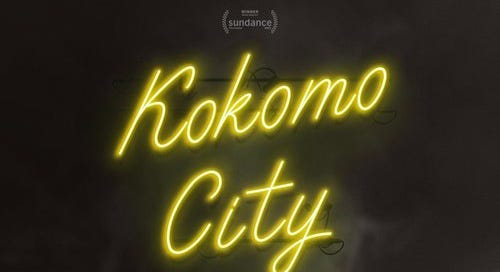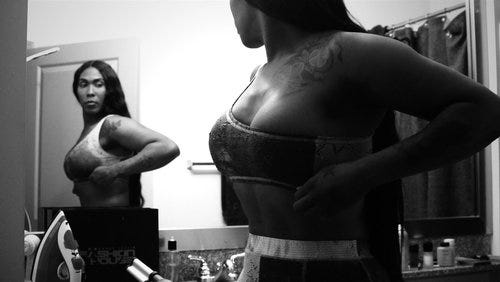As Liyah finds herself with a gun pointed at her face, she has to decide what to do. She grabs it and fires it, only to have it not go off. The gun owner runs off, but contacts her again later, because Liyah is a sex worker and he decided that he still wanted the services that she offered.
This is the opening story to D. Smith’s directorial debut, the documentary “Kokomo City.” I had the opportunity to see a screening of this award-winning film at the Appalachian Queer Film Festival in Huntington, WV, and it was a powerful piece of art.
“Kokomo City” follows four black trans sex workers around the United States. It is a frank look at how these women survive in spaces that both love them, but also fear them; that want what they have to offer, but don’t want anyone to know that they’re offering it; that desire them, but will commit violence against them.
As Daniella Carter, Koko Da Doll, Liyah Mitchell, and Dominique Silver share their stories, the curtain is pulled up on the intersection of sex work, transness, blackness, and womanhood in a way that is rarely explored. As Koko relays the deaths of several of her friends, she tells the camera, “The orgasm comes first, then the violence.” Tragically, Koko did not survive to see the release of this film, as she was yet another trans woman of color who was murdered. She is one of at least 19 trans people who have been murdered this year.
In a Q&A following the screening that I attended, Dominique and Daniella offered more insight into the film and their lives. One thing they emphasized was that this movie was not created for white people. They acknowledge that particularly in the black community, there are biases and experiences that can make this more difficult for people in the black community.
In the film, Daniella talks about how her transition was difficult for her mother, because she lost so many black men in her life, through the prison system or violence, and when Daniella transitioned, she lost yet another black man in her life. While that doesn’t excuse any decision to reject a child, it is a unique experience to black mothers.
The film is shot entirely in black and white, which allowed the women on screen to be a little more at home, since makeup was less of a concern for them. Many of the longer takes are shot from below the subjects, allowing them to impose on the screen, rather than feeling small. Smith also edited the entire film in iMovies, a reminder that the tools are not what make a film great, but rather the vision of the filmmaker.
In one extended scene, Daniella is in a bathtub, talking about how it feels to walk into a Benihana and be surrounded by cis women sitting in their business suits. She asks, “Why is it that a woman has to suck a dick to go to Benihana?” She laments that the only resource that some women have are men. But she defiantly states that at the end of the day, “We were just two ambitious women trying to achieve a goal.”
This film challenges preconceived notions that you might have about black, trans sex workers. The final shot pulls back to reveal Koko in her full, nude glory and it is impossible to deny that she is a woman. Earlier in the film, Dominique says, “There’s all types of girls out there. Just be the girl you are.”
These women aren’t my enemy, they’re just girls like me. We can share a table at Benihana and know that we both deserve a seat there.
You can rent or purchase Kokomo City at Amazon.






